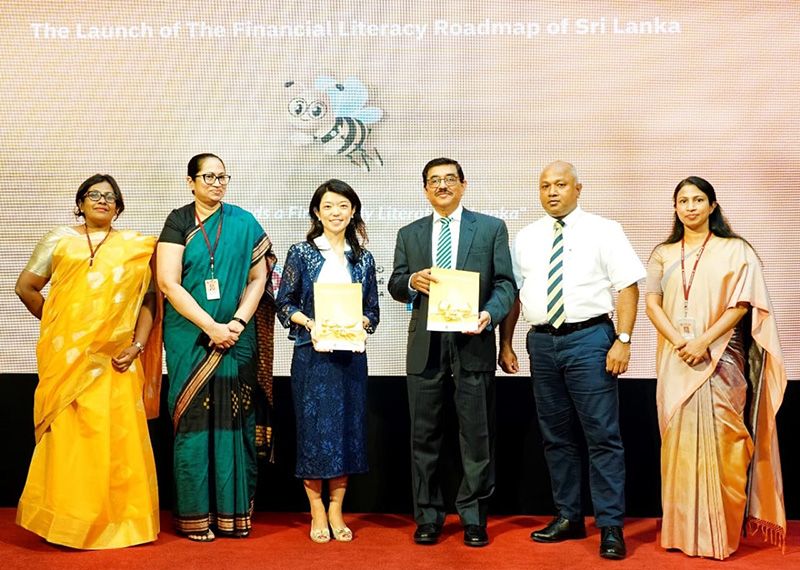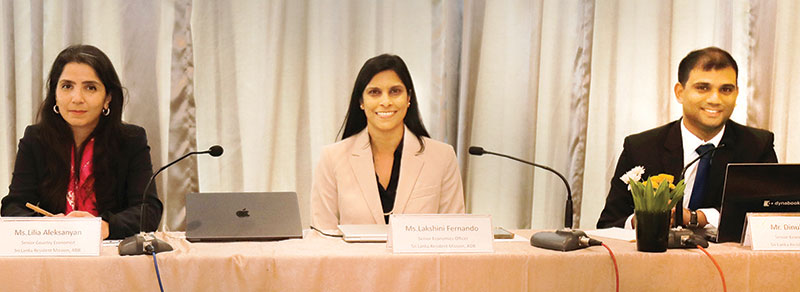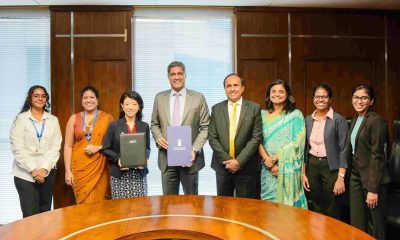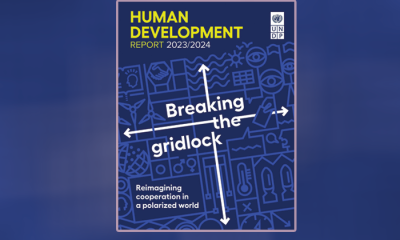Business
UNDP and IFC helping Sri Lanka to discover financial inclusion

By Sanath Nanayakkare
The barriers to financial inclusion have been a longtime problem in Sri Lanka as financial literacy has thus far been the prerogative of only the nation’s affluent customers.
However, eventually the Central Bank of Sri Lanka, 40 other national institutions, the public and private sector of the country along with the United Nations Development Programme (UNDP) and the International Finance Corporation (IFC) are now looking to help broaden financial literacy among the general public of the country to help them achieve financial freedom without allowing it to remain an exclusive right anymore.
This was revealed when the Financial Literacy Roadmap of Sri Lanka (2024-2028) was unveiled at the Central Bank of Sri Lanka on May 21st 2024.
The roadmap developed under the Financial Literacy and Capacity Building pillar of the National Financial Inclusion Strategy (NFIS) quite obviously incorporates sequenced actions proposed by the United Nations Development Programme and the International Finance Corporation (IFC) which were described by the Central Bank Governor Dr. Nandalal Weerasinghe as vital partners in rolling out the roadmap.
Introducing Mr. Beewise – the Sri Lankan Financial Literacy Expert in the first-ever financial inclusion roadmap for Sri Lanka, the multi-stakeholder knowledge tank promotes two aspects leading to financial inclusion in Sri Lanka; namely, knowledge and skills and attitude of the Sri Lankan general public by taking a cue from the busy bees.
“Bees, skilled in searching for and using resources reflect the value of knowledge to steer the day to day life prudently. The skills bees demonstrae in collecting nectar and producing honey reflect the practical skills needed in finance, budgeting, saving, investing and managing debt. And that is why we are referring to the analogue of the bee in this context,” said UNDP Resident Representative for Sri Lanka, Ms. Azusa Kubota.
“One of the mandates the Central Bank has been given is Financial Inclusion, and our endeavor towards this national agenda is strengthened and supported by the United Nations Development Programme (UNDP), the International Finance Corporation (IFC) and the members of the National Financial Inclusion Council,” said CBSL Governor Dr. Nandalal Weerasinghe.
He further said:
“Financially literate people make informed decisions about savings, investments and borrowings. They are more likely to understand the impact of the monetary policy decisions we take, and respond appropriately in line with monetary policy stance, contributing to effective monetary policy implementation.”
“Secondly, financially literate consumers will make informed choices and will demand efficient, transparent and responsible culture from the financial institutions rather than we need to regulate them all the time. Financial literacy will increase public trust in the financial system by supporting individuals to understand how the financial system works. This understanding is very important for the public to make their financial decisions. Further, financial consumers will be empowered to safeguard themselves against financial frauds which are growing with the new of technologies. More importantly, financial literacy can support reducing over-indebtedness and alleviating poverty.”
“Informed access to financial services enables people to manage their finances better, save for the future and invest in opportunities that benefit them. In the long run, this will reduce the burden on the government in terms of having to provide a social safety net, and will enable them to have better living conditions. Financially literate people can come out of poverty from their own financial decisions. A forward looking aspect of financial literacy advocates equipping the future generations with necessary financial capabilities to be financially resilient when they become adults. So, it is important for them to acquire financial literacy at school and university level.”
“Thus investing in financial literacy will be an investment in higher social and economic returns. So there are clear social and economic benefits out of financial literacy in any country. In this backdrop, the Central Bank of Sri Lanka is striving to improve the financial inclusion landscape of Sri Lanka through various initiatives.”
“The introduction of National Financial Inclusion strategy in 2021 with the help of all stakeholders by the Central Bank is currently in its implementation phase. That marks a significant milestone. The new CBSL Act entrusts the duty of promoting financial inclusion. The mandate has been given to the CBSL to formally promote financial inclusion. This road map provides an evidence based policy framework aimed at positively changing the financial behavior towards the betterment of the general public in Sri Lanka.
“Thirdly, creating of vigilant consumers is important to ensure consumer protection. As a whole, the implementation of this roadmap will be crucial in realizing the aspirations of financial inclusion in Sri Lanka,” he said.
Business
ADB urges SL to accelerate recovery with fiscal discipline and global trade shifts

Recommends prudent policy choices and regional collaboration
The Asian Development Bank (ADB) has highlighted Sri Lanka’s economic recovery as exceeding initial expectations in its Asian Development Outlook April 2025 report, but cautioned that the rebound remains fragile, with significant risks posed by global trade tensions, fiscal pressures, and unresolved debt vulnerabilities.
The following are some key highlights from the report:
Sri Lanka’s economy is projected to grow at a moderate pace in 2025–2026, driven by broad-based improvements. However, domestic demand is expected to stay sluggish, reflecting lingering challenges from the country’s recent economic crisis. While fiscal consolidation efforts remain on track bolstered by stronger-than-anticipated revenue. With that said, however, the ADB warned that under-execution of capital spending or a loss of reform momentum could derail progress.

Takafumi Kadono, ADB Country Director for Sri Lanka, brings profound expertise in both macro and microeconomic dynamics, steering transformative development support tailored to Sri Lanka’s evolving needs
After a period of deflation, Sri Lanka’s inflation is forecast to rise in 2025 due to higher electricity tariffs, relaxed import restrictions, wage hikes, and exchange rate depreciation. The government’s commitment to fiscal discipline faces pressure from potential expenditure increases, even as external debt interest payments resume, pushing the current account into deficit.
The ADB’s analysis of new US tariffs, identifies Sri Lanka as vulnerable to trade disruptions. Key risks include:
Sri Lankan exporters, particularly in sectors with thin profit margins, face order cancellations and profit losses.
Competitors like India, Malaysia, and Mexico—benefiting from lower US tariffs—could attract investment away from Sri Lanka.
Full implementation of tariffs could slash GDP growth by depressing exports, manufacturing, and investor confidence, while raising unemployment and fiscal strains.
To mitigate risks, the ADB urges Sri Lanka to diversify export markets and products. Opportunities include expanding into niche EU markets and Asian regional partners, as well as boosting high-value sectors like electronics. Strengthening regional cooperation and accelerating structural reforms could enhance resilience.
Despite progress under its IMF program, Sri Lanka’s debt burden remains “high,” requiring sustained reforms to stabilise public finances. The ADB emphasised that fiscal reversals or delays in restructuring could undermine macroeconomic stability.
While South Asia remains the fastest growing subregion fueled by India’s robust domestic demand, Sri Lanka’s trajectory is distinct, marked by post-crisis recovery challenges. Developing Asia’s overall growth is moderating due to US-China trade tensions and China’s property sector woes, further complicating Sri Lanka’s external environment.
“Sri Lanka’s recovery is commendable but incomplete,” the report states. “Accelerating reforms, safeguarding fiscal discipline, and diversifying trade partnerships are critical to navigating global headwinds and ensuring long-term stability.”
As Sri Lanka balances optimism with fragility, the ADB’s outlook underscores the urgency of maintaining reform momentum while preparing for escalating external risks. The path to sustained recovery, concludes, hinges on prudent policy choices and regional collaboration.
By Sanath Nanayakkare
Business
HOPPR Unveiled: PayMaster’s latest innovation that transforms ride-hailing and digital credit access

PayMaster, the leading, award-winning digital payments app in Sri Lanka, has announced its launch of HOPPR, a cutting-edge ride-hailing feature that will transform the market by providing all stakeholders from drivers and customers with financial independence through digital payments and credit access. More than just a ride-hailing service, HOPPR is a tool for financial empowerment that works in unison with PayMaster to allow users to schedule rides without using cash and to open up long-term revenue streams.
A sustainable revenue strategy is established by its unique referral system, which allows drivers to receive lifetime earnings for each user referred, emphasizing that both passengers and drivers are not just participants but valued stakeholders of the platform. Additionally, CREDDY, an AI-powered credit system that acknowledges informal income streams, is connected with HOPPR where drivers can obtain revolving credit of up to Rs.50,000 at 0% interest through CREDDY for everyday expenses, fuel, and vehicle repairs, assisting in closing gaps in their finances and fostering financial stability.
Ransika De Silva, Director/CEO of PayMaster, stated, “With HOPPR, we have built a driver-centric system where each ride is an opportunity to earn, save, and grow financially rather than just a journey. We are changing the financial landscape for gig workers and informal earners, starting with ride-hailing, digital payments, credit access and future expansion into areas for informal income.”
PayMaster is a one-stop app for payments that makes transactions in Sri Lanka easy. From local money transfers, receiving money from around the globe to a local account within two seconds, paying bills, and topping up mobile accounts, users can now also use ride-hailing services thanks to HOPPR. PayMaster, a fully owned subsidiary of Singapore-based FinTech FirstPay (Pte) Ltd, guarantees the highest international security standards by following the criteria for mobile apps from the Central Bank of Sri Lanka (CBSL) and submitting to frequent security assessments conducted by a globally reputed auditing firm.
Business
CSE launches in bullish vein, energized by US President’s ‘90-day pause’

The CSE opened yesterday in a bullish manner after US President Donald Trump announced a 90-day pause on enforcing increased tariffs on exports.
President Trump said he is ordering a pause on ‘reciprocal’ tariffs slammed on Sri Lanka and other countries after 75 countries offered to negotiate, amid a collapse of stock markets, but a 10 percent tax would remain. Many stock markets around the world were back in the green.
The All Share Price Index was trading up on 693 points within the first half hour of opening and the more liquid S&P SL20 was up 6.42%, or 286 points, at 4,632.00.
Turnover was Rs 6.1 billion with ten crossings. Those crossings were reported in JKH which crossed 30.7 million shares to the tune of Rs 607 million and its shares traded at Rs 20.10, Sampath Bank 3.7 million shares crossed for Rs 419 million; its shares traded at Rs 150, Commercial Bank 2.2 million shares crossed for Rs 151 million; its shares traded at Rs 125.
Singer (Sri Lanka) 1.5 million shares crossed for Rs 52.5 million; its shares traded at Rs 35, Vidul Lanka 3.7 million shares crossed for Rs 49.4 million; its shares traded at Rs 13.50, People’ Leasing 2 million shares crossed to the tune of Rs 35 million; its shares sold at Rs 2.70, HNB 100,000 shares crossed to the tune of Rs 30.5 million, Hemas Holdings 210,000 shares crossed for Rs 23.4 million; its shares traded at Rs 117, LMF 500,000 shares crossed to the tune of Rs 21.4 million; its shares fetched Rs 42.70 and DFCC 200,000 shares crossed to the tune of Rs 20 million; its shares traded at Rs 100.
In the retail market top six companies that have mainly contributed to the turnover were; Sampath Bank Rs 709 million (6.2 million shares traded), Commercial Bank Rs 626 million (4.4 million shares traded), HNB Rs 619 million (two million shares traded), JKH Rs 346 million (three million shares traded), RIL Properties Rs 164 million (10.3 million shares traded) and Brown’s Investments Rs 161 million (22.1 million shares traded).During the day 212 million shares volumes changed hands in 23287 transactions.
Yesterday, US dollar buying rate was Rs 297.50, while the selling rate was Rs 298.60.
By Hiran H Senewiratne
-

 Business5 days ago
Business5 days agoColombo Coffee wins coveted management awards
-

 Business7 days ago
Business7 days agoDaraz Sri Lanka ushers in the New Year with 4.4 Avurudu Wasi Pro Max – Sri Lanka’s biggest online Avurudu sale
-

 Features6 days ago
Features6 days agoStarlink in the Global South
-

 Business7 days ago
Business7 days agoNew SL Sovereign Bonds win foreign investor confidence
-

 Features3 days ago
Features3 days agoSri Lanka’s Foreign Policy amid Geopolitical Transformations: 1990-2024 – Part III
-

 Features6 days ago
Features6 days agoModi’s Sri Lanka Sojourn
-

 Midweek Review3 days ago
Midweek Review3 days agoInequality is killing the Middle Class
-

 Features5 days ago
Features5 days agoSri Lanka’s Foreign Policy amid Geopolitical Transformations: 1990-2024 – Part I






















